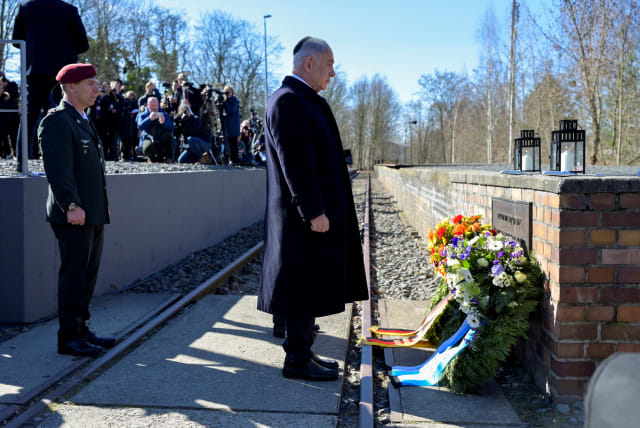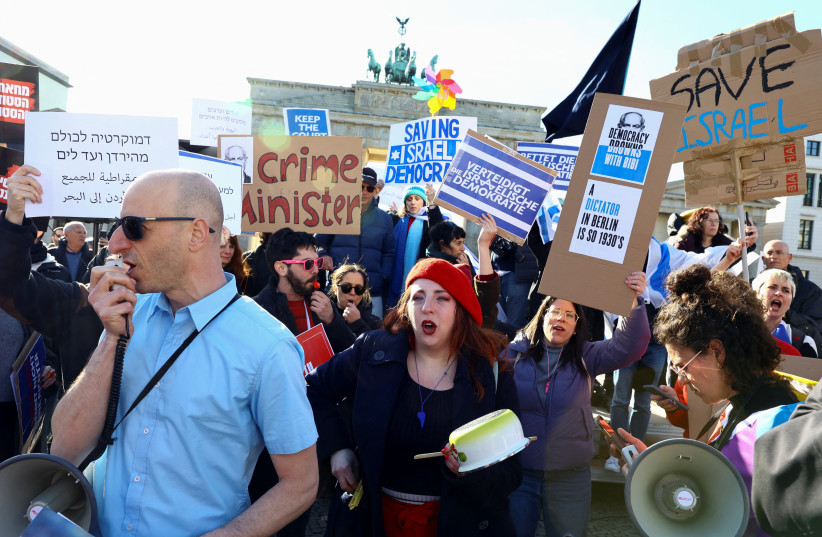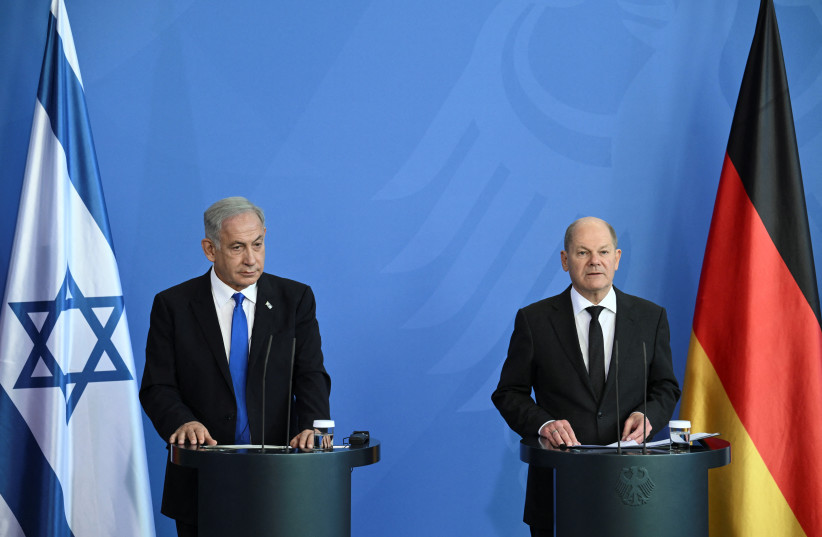Should Israel heed German warnings about a failing democracy? - analysis

Netanyahu has rejected the idea that judicial reform would harm democracy. But should he listen to German warnings, and lessons of the past?
“Democracy. Remember what happened here when it was lost,” read a sign an activist held up in Berlin during the street protest against Prime Minister Benjamin Netanyahu’s visit last week.
It was an ideal location for such a placard. When one talks about the danger of a democracy descending into a dictatorship, one needs to look no further than the very liberal Weimar Republic, which collapsed in 1933 after Adolf Hitler was appointed the country’s chancellor.
This does not mean, of course, that all failed democracies become the Third Reich. It has meant, however, that modern-day Germany has become a global caretaker of the democratic flame due to the legacy of that specific history, littered as it is with missed warning signs. Germany knows from a very personal perspective how democracy can dissolve and how the worst of horrors can unfold when it’s snuffed out.
Netanyahu, therefore, could not have picked a worse destination point than Berlin – the seat of the Third Reich – to escape the domestic turmoil over whether his government’s judicial reform plan would doom Israeli democracy.
Netanyahu has long opted to seek validation abroad with a display of high-level diplomacy to underscore his leadership mastery when compared with that of his opponents. Hence his election slogan, “In a different league.”
It’s an effective visual, particularly because it carries a certain degree of authenticity. While former prime minister and current opposition leader Yair Lapid focuses on street protests, Netanyahu is busy with matters of state, representing the country in the global halls of power to talk about life-and-death issues, such as Iran’s nuclear threat and Russia’s war against Ukraine.
In France, Italy and most recently Germany, Netanyahu generated photo ops of handshakes with world leaders. These aren’t just vanity shots. He is on a mission to secure European support against Iran, which he has compared to the Nazi regime in its desire to annihilate the Jews.
Preventing a second Holocaust by securing the State of Israel has been one of Netanyahu’s central missions, especially with Iran. Now that he is back in the office and Tehran is close to weapons-grade uranium production, the mission to prevent a nuclear Iran is more vital to him than ever.
The danger of Iran to Israel and the global community is easier to highlight in Germany, from which the Final Solution to annihilate European Jewry was conceived and where World War II was launched. Netanyahu underscored that history by starting his one-day visit on Thursday with a stop at Holocaust memorial Platform 17.
Netanyahu aims to prevent an Iranian 'second holocaust'
From 1941-1945, more than 50,000 Berlin Jews were transported to concentration camps from this train station nestled in a residential neighborhood.
As Netanyahu stood on the brick pavement above the abandoned metal rails with German Chancellor Olaf Scholz, he spoke of how the imperative to halt evil early is as relevant today as it was back then. He meant that if only people had stood up then, the Holocaust would not have happened, and therefore, they should stand up now, both diplomatically and, if necessary, militarily before it’s too late.
At the very least, Israel has argued, the international community should back the IDF if it strikes Iran’s nuclear facilities on its own.
The link between Nazi Germany and the Islamic Republic is in keeping with the standard Israeli explanation that the Holocaust came about due to unchecked virulent antisemitism and the absence of a Jewish state that can absorb Jews fleeing persecution and a strong military that can defend that state.
Netanyahu highlighted the importance of Israeli military capabilities, including weapons design, when he spoke of how Israel’s pending sale of the Arrow 3 system to help protect the German skies from Russia had important historic symbolism. The Jewish people, whom the Nazis had once tried to annihilate, were now instrumental in defending Germany.
It was not the only moment in the visit when it seemed that the tables of history had been turned. When Netanyahu spoke of how the evil of the Holocaust could have been stopped early in its tracks, the Germans had their own answer to that question, one that centered on democracy.
When one looks for a significant turning point at which the Holocaust could have been prevented, the fall of the Weimar Republic was certainly one of those moments. As a result, Germany has been one of the most outspoken critics of the judicial overhaul that Netanyahu’s government is fast-tracking through the Knesset.
Learn from Germany's history, Netanyahu is urged
German Justice Minister Marco Buschmann issued a warning to Israel in February at the opening of an art exhibit in Tel Aviv.
“Learning from history means recognizing that democracies can abolish themselves of their own accord if limits are not imposed on the majority,” he said. “Our German Basic Law, therefore, contains a system of checks and balances, including a strong, independent judiciary that can stop any government action that violates the constitution and thus breaks the law.”
German Foreign Minister Annalena Baerbock brought up the issue during a joint press conference she held that same month in Berlin with her Israeli counterpart, Eli Cohen.
So it should have come as no surprise when Scholz spoke out during his press conference with Netanyahu.
“Democracy is not just majority rule, but it’s also about the security of those who remain a minority,” he said.
One of the hotly debated issues regarding the reform plan in Israel is the question of the definition of democracy. Does it mean majority rule in all cases, or is it a system by which minority rights are sacrosanct principles protected by law that cannot be harmed by majority rule?
Opponents of the reform fear that minority rights will be weakened. In a starkly unusual moment, Channel 12’s prominent journalist Ilana Dayan issued a sharp on-air statement last week against the reform, warning specifically about the harm it would do to minority rights, including those of women.
“Ask yourselves just one question: Will there be one thing, one thing, that the majority cannot do to the minority when this [judicial overhaul] process is finished? Then, imagine yourselves in the minority,” she said.
For this reason, over time, most of Diaspora Jewry defined democracy as a system in which individual rights – particularly minority rights – are sacrosanct, aligning itself with the principle articulated by former US first lady Eleanor Roosevelt that any democracy is only as strong as its weakest individual. Such democracies are often seen as a strong defense against antisemitism and often create conditions in which Jewish communities can live safely and flourish.
What's in a democracy?
It would almost seem to go without saying that the first Jewish state in 2,000 years, whose religion provided the first moral blueprint for a global society through the Ten Commandments, would be an example of such a democracy as part of its religious imperative to be a light unto the nations.
Netanyahu, including in Berlin, has persistently rejected the idea that the judicial reform would harm democracy and has insisted that minority rights would be protected, but that just the balance had to be adjusted.
Israel, he has insisted, will remain a “liberal democracy,” explaining that the plan seeks to strengthen both “majority and minority” rights. He has argued in Israel that the opposition has misrepresented the plan as part of its anarchical plan to illegitimately overthrow the country’s elected government.
On Sunday, his son Yair made headlines when he went one step further and compared those protesting the judicial reform with Nazis and Italian fascists of the 1930s.
“They are the ones that are marching Israel toward fascism,” he said. “They are the ones that are adopting the same methods as the ‘Blackshirts’ in Italy and the [Sturmabteilung] in Germany.”
It’s a leap that should not be made about the current government or the judicial reform protesters, and so one treads carefully as Germany has done when reflecting on the Weimar Republic. It’s also impossible to avoid it when visiting a city that still bears the open scars from World War II.
Many Israelis are often annoyed by morality lectures from Europe, particularly from the Germans, because of the Holocaust. Can a country that murdered six million Jews, and a continent that supported it, have something important to say on the protection of rights that should worry Israelis?
One sign at the street protests in Berlin seemed to allude to the obvious: “Seriously, the Germans need to explain to the Israeli PM why fascism is so bad?”
Germany, however, has fully accepted responsibility for the Holocaust. It has not attempted to downplay or explain away its actions. Along with that kind of soul-searching also comes an analysis of the history that led Germany to that moment of Nazi takeover and has, as a result, focused its criticism in particular on the issue of minority rights.
It is equally hard to imagine that Scholz, as the leader of modern Germany, could misread the danger signals of democracy on the path to destruction. If anyone should know what they are talking about on this subject, it should be the Germans.
On Thursday morning, two men stood on a train platform and stared together at a railway track, which is one of the many leftover footprints of the Nazis’ final solution in Germany and Europe.
Each one wanted to avert disaster and found a deaf ear. Netanyahu spoke of the dangers of a nuclear Iran during his time with Scholz, but the chancellor did not agree to Israel’s request to designate the Islamic Revolutionary Guard Corps a terrorist entity.
Scholz spoke of the importance of securing minority rights, explaining that Israel’s judicial reform did not offer proper protection. But Netanyahu dismissed the concern and insisted that the plan did support those rights.Historical hindsight is 20/20, but it’s impossible to know in the moment when one has hit the point of no return.
The train tracks symbolized past missteps, but they also stretch into the future and to an unknown horizon toward which both men are global conductors.
Only history will tell who should have listened to whom at that moment.
Jerusalem Post Store
`; document.getElementById("linkPremium").innerHTML = cont; var divWithLink = document.getElementById("premium-link"); if (divWithLink !== null && divWithLink !== 'undefined') { divWithLink.style.border = "solid 1px #cb0f3e"; divWithLink.style.textAlign = "center"; divWithLink.style.marginBottom = "15px"; divWithLink.style.marginTop = "15px"; divWithLink.style.width = "100%"; divWithLink.style.backgroundColor = "#122952"; divWithLink.style.color = "#ffffff"; divWithLink.style.lineHeight = "1.5"; } } (function (v, i) { });



